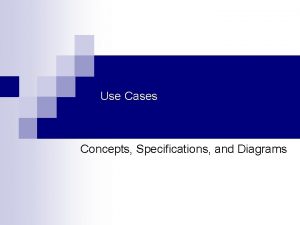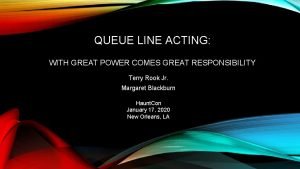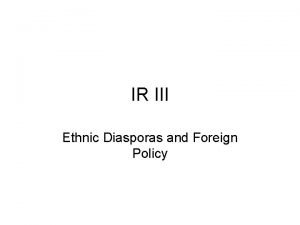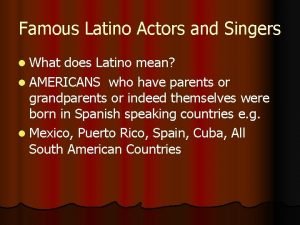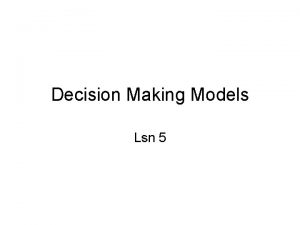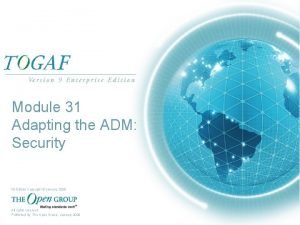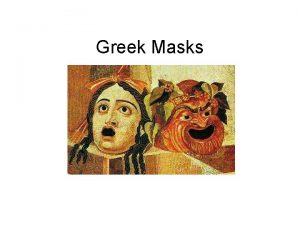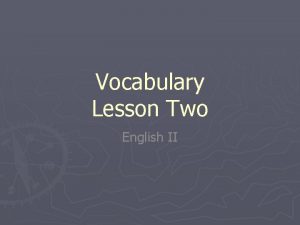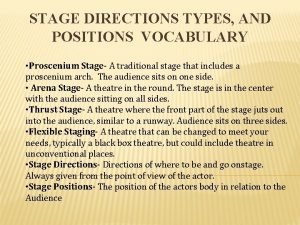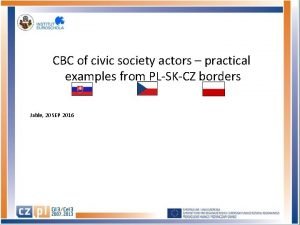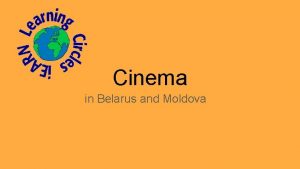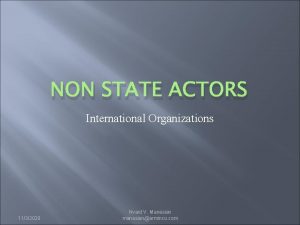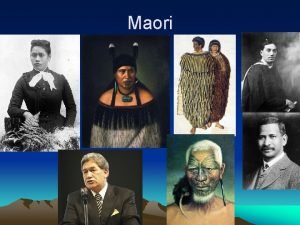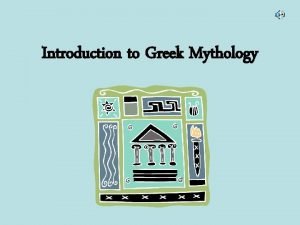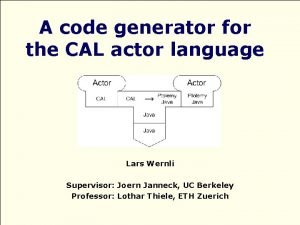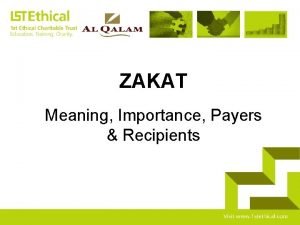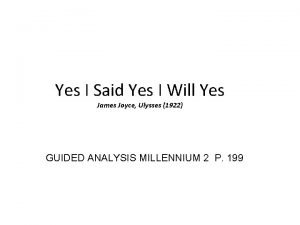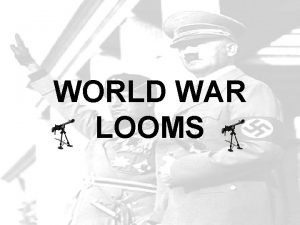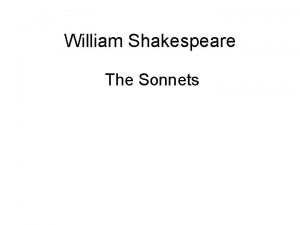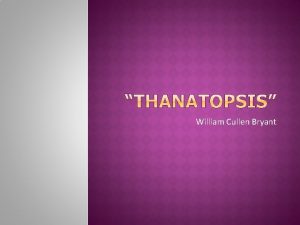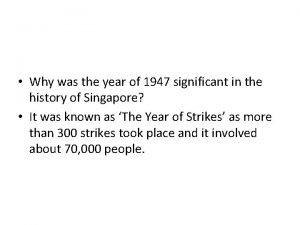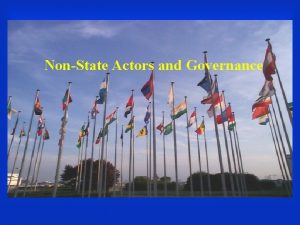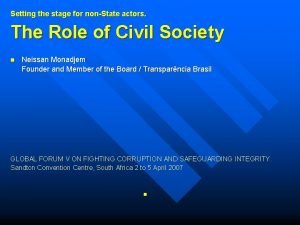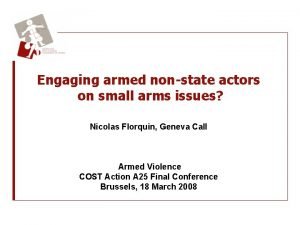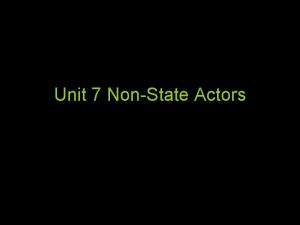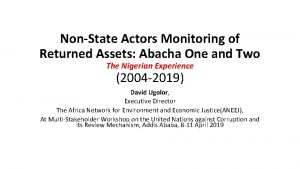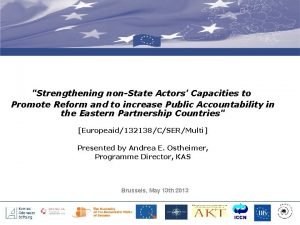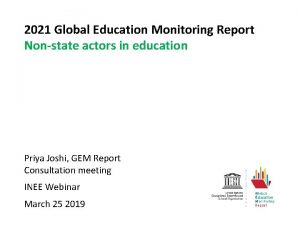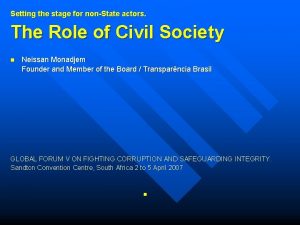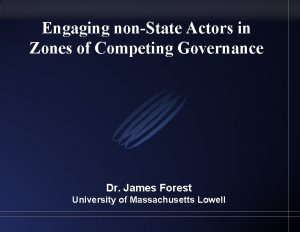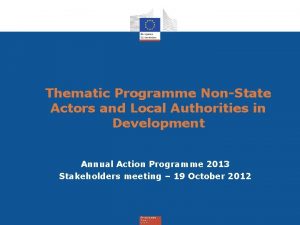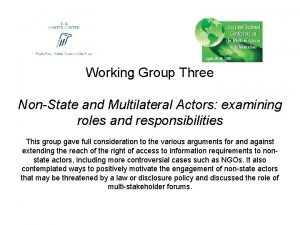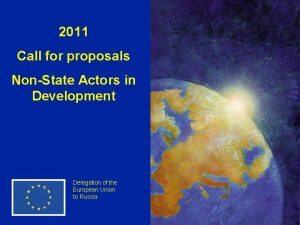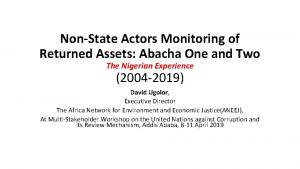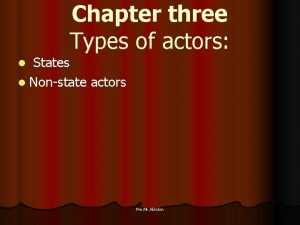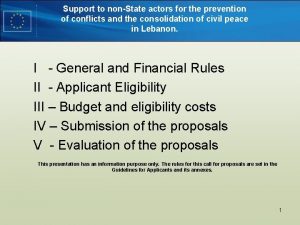NONSTATE ACTORS IN IR SUMMARY Nonstate actors in


























































- Slides: 58

NON-STATE ACTORS IN IR

SUMMARY Non-state actors in a pluralistic concept Characteristics of activity and influence Individuals TNCs Civil society NGOs Epistemic communities and others Methods and tools Impacts on IR

WHO IS A NON-STATE ACTOR?

NON-STATE ACTORS - OVERVIEW International NGO International non-governmental movements, transnational networks of activists Churches and religious movements Epistemic communities Significant individuals with international influence Multinational corporations / transnational corporations / economic entities entering international markets National liberation and rebel movements Illegal / illegal actor Organized crime, drug cartels Terrorist cells…

IMPORTANCE OF NON - STATE IN IR Important Marginal Rising

Joseph Nye GLOBAL POWER SHIFTS

INDIVIDUALS – WHO?

INDIVIDUALS – FACTORS OF INFLUENCE policy created by one or only a few key actors no vital interests of states foreign policy apparatus (bureaucracy) remains aside public opinion

TRANSNATIONAL CORPORATIONS (TNCs) also multinational corporations private companies with economic interests in several countries at the same time sui generis entity (debates on whether or not IO) increasingly autonomous/independent players (e. g. enlargement of NATO to the East and pressure of the US armaments industry)

TNCs – BASIC CHARACTERISTICS present on multiple markets profit from the division of production and trade in more countries benefits from different countries (mineral wealth, labor cost, tax conditions. . . ) benefits of scale considerable economic power - the possibility of pressure on (some) states

TNC´s Impact on states? Positive vs negative impact? Examples?

TNCs – POSITIVE INFLUENCE liberalization of world trade growth of world trade Internationalization modernization (e. g. technical assistance projects) regional or global interdependence (conflict prevention - civil society development, education programs, …)

EXAMPLE: PANDORA

UN Global Compact Human rights Labor CSR - UN Global Compact Environment Corruption

UN Global Compact Human Rights Principle 1: Businesses should support and respect the protection of internationally proclaimed human rights; and Principle 2: make sure that they are not complicit in human rights abuses. Labour Principle 3: Businesses should uphold the freedom of association and the effective recognition of the right to collective bargaining; Principle 4: the elimination of all forms of forced and compulsory labour; Principle 5: the effective abolition of child labour; and Principle 6: the elimination of discrimination in respect of employment and occupation. Environment Principle 7: Businesses should support a precautionary approach to environmental challenges; Principle 8: undertake initiatives to promote greater environmental responsibility; and Principle 9: encourage the development and diffusion of environmentally friendly technologies. Anti-Corruption Principle 10: Businesses should work against corruption in all its forms, including extortion and bribery.

TNCs – NEGATIVE INFLUENCE main goal = profit excessive concentration of power and wealth (conflicts) influence in less developed countries is not always positive (non-democratic political regimes) the interest in a sustainable environment does not necessarily coincide with the main objective social dumping, human rights

EXAMPLE: (S)HELL

TNCs – CONSEQUENCES FOR STATES generally difficult to evaluate contribution to welfare source of revenue for governments employment violations of labor standards use of low environmental standards efforts to destabilize uncomfortable governments . . .

SEMI-OFFICIAL AND UNOFFICIAL ORGANIZATIONS WITH INTERNATIONAL REACH groups with their own goals and tools to promote them internationally (often illegal) a highly hierarchical structure with its own standards / values

ILLEGALITY AND ILLEGITIMACY OF ACTIONS illegal targets, methods - national / international liberation movements, insurgent movements organized crime terrorist groups

A NATIONAL LIBERATION REBEL MOVEMENT position specifics: illegality x legitimacy? sources of legitimacy ? ? ? methods of pursuing goals ? ? ?

ORGANIZED CRIME (TRANSNATIONAL) a product of globalization - easier transportation, information exchange, financial flows, more intensive contact… territorial organization of states and combating crime (Interpol, Europol, World Customs Organization)

FREQUENT FORMS corruption (over USD 1. 5 trillion per year) cybercrime (1 trillion USD) drugs (0. 5 trillion, 200, 000 lives) counterfeiting (0. 25 trillion) ecological (30 billion) trafficking of human beings (30 billion, 27 million people) theft, piracy, organ trafficking (7, 000 victims), arms trafficking total over 2 trillion USD, 1. 6 trillion. manages to "wash"

PROFIT FROM DISTRIBUTION BETWEEN COUNTRIES home country host country transit country service country the most affected continents - America, Africa

RELIGIOUS MOUVEMENTS IN IR religious movements vs. Church declining importance in IR? identity - an image of society about itself and others religious identity stronger than national Samuel P. Huntington Clash of Civilizations (1993 - 1996 - 2001) Francis Fukuyama - The End of History and the Last Man (1989 - 1992 - 2002) the end of the Cold War by the victory of liberalism

CHURCHES IN IR historically: territorial sovereign source of unwritten moral rules and written norms today: tendency to secularization political power in some states influence on the operation of the state, foreign policy, missionary activity

EPISTEMIC COMMUNITIES = scientific communities - Peter M. Haas 1989 environmental protection existence vs. construction problem role of epistemic communities in the construction of the problem ability to construct, public confidence


EXAMPLES 19 th century. 20 th century. lawyers (Rafael Lemikin) environmentalists economists (Washington vs. postwashington consensus)… 21 st century doctors ? ? ? epistemic community usually limited influence, necessary use of public opinion, cooperation with other actors

EPISTEMIC COMMUNITIES “ON BOTH SIDES”

PREREQUISITE OF SUCCESS OF EPISTEMIC COMMUNITIES international problem solving consensus on the issue – e. g. ecosystem protection in the Mediterranean (UNEP - Mediterranean Action Plan) climate change solution costs relationship to the interests of the state

COOPERATION OF EPISTEMIC COMMUNITIES AND NGOs mobilization of the epistemic community - expert definition of the problem “Public” definition of the problem - construction (framing) - cultural representation of the problem symbols

EPISTEMIC COMMUNITIES AND NGOs: CONSTRUCTION OF A PROBLEM epistemic communities technical definition of the problem NGOs "Public" definition of the problem construction (framing) mobilization cultural representation of the problem - symbols

ACADEMIC VS. PUBLIC DEFINITION OF PROBLEM – EXAMPLE


PUBLIC DEFINITION / CONSTRUCTION OF THE PROBLEM – RESULTS different design flexibility success and response of structures “Masterful constructions” - widely applicable, transferable between different cultures for example, prisoners of conscience, female genital mutilation circumcision, return to democracy

CIVIL SOCIETY Function? Examples?

KALDOR – CIVIL SOCIETY “By civil society I mean the medium through which people participate in public affairs outside formal institutions. In a global era, where force and diplomacy are less important in relations between states, the role of civil society in bringing about political change is much more salient. ” “Civil society is a voice, not a vote. ” Civil society – participation; NGOs as ‘tamed’ social movements The role of new information and communication technologies It facilitates activism It has enormously accelerated our awareness of what goes on elsewhere It fosters extremism – FB and freedom of expression?

NGOS

NON-GOVERNMENTAL SECTOR Definition and terminology (third sector) The part of an economy or society comprising non-governmental and non-profit-making organizations or associations, including charities, voluntary and community groups, cooperatives, etc. Most third sector organizations tend to assert the primacy of ‘values’ in their organizational set-up. Principles Impartiality Independence Non-proselytizing Accountability Transparency Humanity

NON-GOVERNMENTAL SECTOR Typology: Non-State, non-profit making actors operating on an independent and accountable basis which include: non governmental organisations, organisations representing indigenous peoples, organisations representing national and/or ethnic minorities, diaspora organisations, migrants' organisations in partner countries, local traders' associations and citizens' groups, cooperatives, employers' associations and trade unions (social partners), organisations representing economic and social interests, organisations fighting corruption and fraud and promoting good governance, civil rights organisations and organisations combating discrimination, local organisations (including networks) involved in decentralised regional cooperation and integration, consumer organisations, women's and youth organisations, environmental, teaching, cultural, research and scientific organisations, universities, churches and religious associations and communities, the media and any non governmental associations and independent foundations, including independent political foundations. Functions: humanitarian, human rights, development and environment

INGOS non-governmental associations (governments are not directly involved in their activities) organization vs. movement vs. transnational network regular interactions that permeate world politics and surpass national borders; at least one of the actors in these relations is not the state or government participate in an international environment

ACTIVITIES AND FORMS Conditions: structure, activity and interests cross borders members are not states, but social organizations, societies or individuals Types: political focus non-political focus various associations, companies, foundations, unions, committees, clubs, leagues, conferences, federations, conventions ex: Scout Movement, International Olympic Committee, MSF, Amnesty International, Greenpeace and others.

AREAS OF ACTION development, humanitarian, cultural, scientific, technical, religious or economic cooperation INGO is more respected by governments in some areas (eg post-conflict reconstruction humanitarian area)

NGOs

INGOs – SPECIFICS organization - legal personality task and activities in the absence of global ethics representation of interest - democratic deficit (New Great vs. Never Good) GONGO (Governmental Organized), GINGO (Inspired), GRONGO (Regulated / Run - Initiated) BINGO (Business Interest), BONGO (Business Organized), MONGO (My Own), MANGO (Mafia-Organized)

NGOs - PROBLEMATIC NEVER GOOD: Example White Revolution - Mission Statement “We seek a paradigm shift in our values, a revolutionary worldview in our people, and a fundamental change in the form and focus of our governing bodies. The government of the United States of America, as well as all other formerly White controlled countries, seeks to deny Whites the right to White neighborhoods, White communities, White schools, White associations, and all other cultural tools necessary for the survival of our race. " (taken from: http: //whiterevolution. com/? page_id=15)

ACTIONS AND FUNCTION OF NGOs Goals: political - not taking power means: mobilizing public opinion, pressure on political representation inside states internationally

BASIC INSTRUMENTS

EXAMPLES - CAMPAIGNS - END OF POVERTY


OTHER CAMPAIGNS- ? ? ?

ACCOUNTABILITY AND FUNDING MANAGEMENT Most of INGOs have projectbased operation funded by external donors = source of funding International aid funding – trickle down effect Conditioned international funding to INGOs – most of funders have programming plans and assumptions Primary funder (EU, NORAD, World Bank, EIB, USAID, etc. ), intermediary funder (INGO) and local NGO

ACCOUNTABILITY AND FUNDING MANAGEMENT Paris principles (foreign aid), 2005 Donors and recipients (INGOs) both agreed to commitments and to hold each other accountable for achieving aid effectiveness. The Paris Declaration lays out a practical, action-oriented roadmap to improve the quality of aid and its impact on development. A series of specific implementation measures and establishes a monitoring system to assess progress and ensure that donors and recipients hold each other accountable for their commitments. Five principles for aid effectiveness: ownership, alignment, harmonisation, results and mutual accountability. Busan principles, 2011 A turning point in international discussions on aid and development (global monitoring framework for development assistance, private sector). The Busan Declaration establishes for the first time an agreed framework for development cooperation that embraces traditional donors, South-South co-operators, the BRICS, civil society organisations and private funders.

ACCOUNTABILITY AND FUNDING MANAGEMENT Interdependence between funders and NGOs While NGOs depend on funds, funders rely on NGOs for information, community outreach, and to maintain or enhance their own reputation Interdependence is also determined by economic (funding) and symbolic capital (reputation, prestige, capacity) or resources that NGOs and funders posses Managerial and reporting activities Yearly financial closure and audit Internal and external reporting (outputs, outcomes) Reviews and feedback mechanisms with beneficiaries Due diligence

ACCOUNTABILITY AND FUNDING MANAGEMENT The functions of management (such as controlling, planning, motivating, directing or monitoring) can be distinguished from the style of this management (such as consultative, participatory, cooperative or top-down). In other words, the fact that something ‘gets done’ is only one aspect of management, because it may also be important to consider the way in which it is done. (Paton, 1991)

CHALLENGES NGOs respond, sometimes in unexpected ways, to the ideas and demands of funders. And sometimes, they engage in complex learning processes that eventually lead to modifications in activities and ideas about development. Donors or funders have often pre-set ideas without any leeway for modifications and flexibility in implementation. All too many CSOs and Donors spend too much time on project bureaucracy occasioned by the desire to prove “Value for Money” which means proving that you have spent foreign donors money with due diligence. The donors have their rules and regulations, and the CSOs tend to apply and get foreign funding for projects (low self-reliance). There was very little interest in pursuing alternative resourcing strategies.

OTHER MATERIALS Samuel Huntington on the 'Clash of Civilizations’ https: //www. youtube. com/watch? v=3 SNic. JRc. Uqs Francis Fukuyama: The End of History and the Last Man https: //www. youtube. com/watch? v=v. ZWJETpfbz. M
 Use case with multiple actors
Use case with multiple actors Use case primary and secondary actors
Use case primary and secondary actors Pengertian include dan extend
Pengertian include dan extend Include extend use case
Include extend use case Acting queue
Acting queue Market actors definition
Market actors definition Actors in foreign policy
Actors in foreign policy Include extend use case
Include extend use case Gloria estefan married to emilio estevez
Gloria estefan married to emilio estevez Rational actor model cuban missile crisis
Rational actor model cuban missile crisis Game use case diagram
Game use case diagram Security actors
Security actors Marketing management
Marketing management Italian renaissance actors
Italian renaissance actors How to make greek masks
How to make greek masks Greek actors
Greek actors The most dramatic force shaping our destiny is:
The most dramatic force shaping our destiny is: A hated, repellant person or thing
A hated, repellant person or thing Othello character chart worksheet answers
Othello character chart worksheet answers Proscenium stage model
Proscenium stage model Global health actors
Global health actors Used cases
Used cases Civic actors examples
Civic actors examples The business actors
The business actors In what way is thisbe's final speech humorous
In what way is thisbe's final speech humorous Elizabethan theatre presentation
Elizabethan theatre presentation Belarus actors
Belarus actors Who are non state actors
Who are non state actors Morena maori
Morena maori Zeus and kronos were greek actors
Zeus and kronos were greek actors Calactor
Calactor Five actors were competing for the leading role in the play
Five actors were competing for the leading role in the play Zakat definition
Zakat definition Social media strategy executive summary
Social media strategy executive summary Young goodman brown pictures
Young goodman brown pictures Yes i said yes i will yes guided analysis
Yes i said yes i will yes guided analysis Wuthering heights chapter 4 summary
Wuthering heights chapter 4 summary Wuthering heights chapter 34 summary
Wuthering heights chapter 34 summary Objective summary verbs
Objective summary verbs Parts of the summary
Parts of the summary What's an objective summary
What's an objective summary Objective summary
Objective summary How to write an objective summary example
How to write an objective summary example Summary definition
Summary definition News report summary
News report summary What is a critical summary
What is a critical summary Atlantic charter summary
Atlantic charter summary Working together to safeguard children 2020
Working together to safeguard children 2020 Roe vs wade summary
Roe vs wade summary Leanora sutter
Leanora sutter Sonnet 144 summary
Sonnet 144 summary So live that when thy summons comes
So live that when thy summons comes Circus animals desertion
Circus animals desertion Where was the little black boy born?
Where was the little black boy born? Please be quiet. i (try) to sleep
Please be quiet. i (try) to sleep Merdeka talks
Merdeka talks Why be happy when you could be normal themes
Why be happy when you could be normal themes Why be happy when you could be normal summary
Why be happy when you could be normal summary Who moved my cheese summary
Who moved my cheese summary

